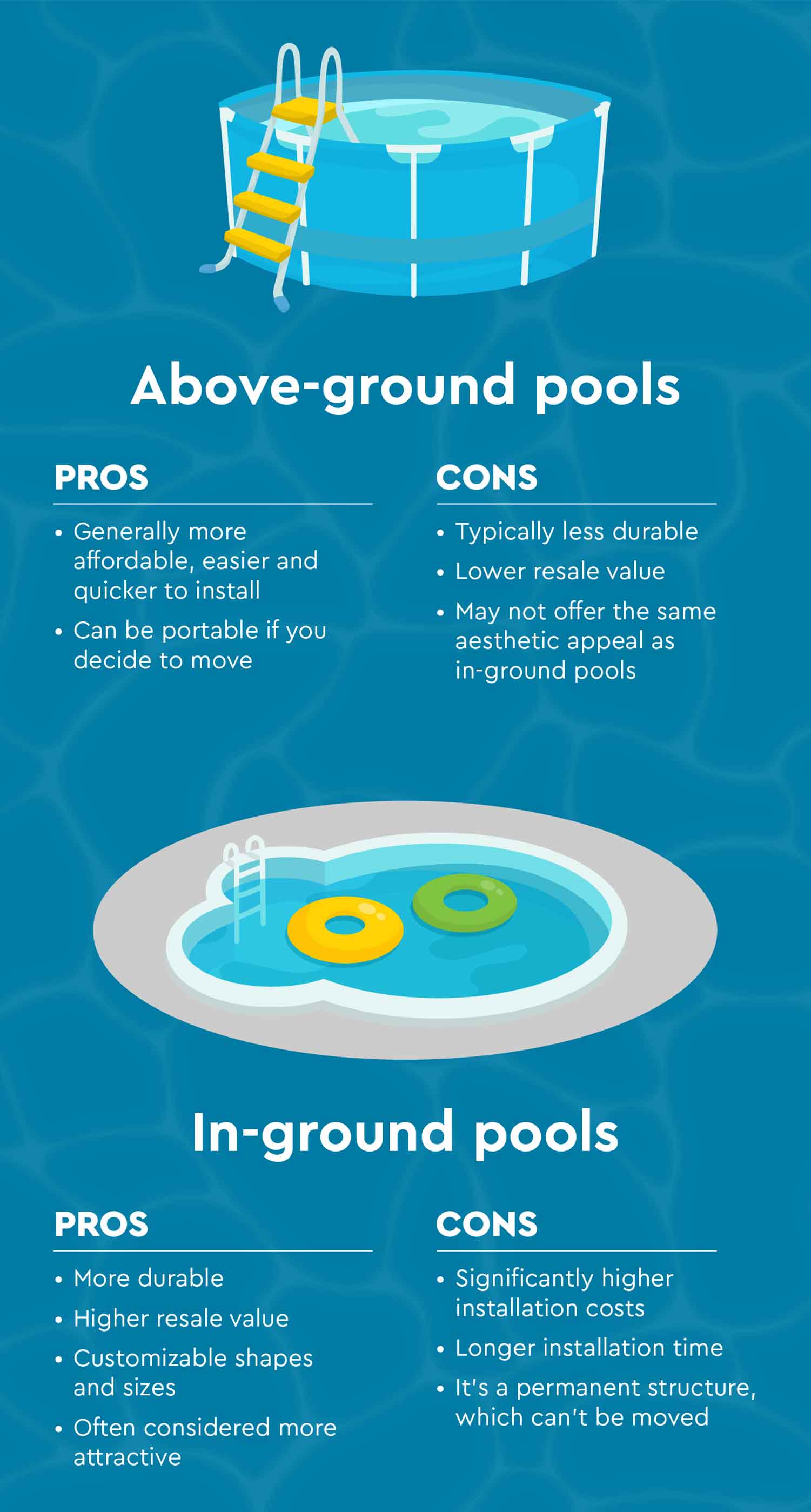Backyard pool costs: Important things to know.
Installing a backyard pool can transform your outdoor space into a private oasis, perfect for relaxation, exercise and entertainment. But before you get started, there are important elements to take into consideration. Between the initial cost of installing and the maintenance, pools can be expensive — make sure to educate yourself before diving in too deep.
What type of pool should you consider?
Do you want an above-ground pool? A traditional in-ground one? There’s are myriad options when considering installing a pool, but they all come with a price tag, depending on how specialized you’d like it to be.
Initial cost factors.
The installation costs for above-ground pools can vary depending on the size and type of pool you choose. Basic models are relatively inexpensive, but more elaborate setups with decks and other features can increase costs significantly.
Installation costs for in-ground pools, however, are considerably higher. Factors such as the size, shape and type of materials (e.g., concrete, vinyl, fiberglass) will influence the total cost. Custom designs or additional features such as lighting, heating and automated cleaning systems can further increase the price.
If you’re debating between the two, in-ground pools are generally suitable for homeowners seeking a long-term investment and a customized look. Above-ground pools are ideal for those with budget constraints or temporary needs.
You should also factor in any needed permits or insurance costs. Both types of pools may require permits from local authorities, and it’s essential to check your homeowner’s insurance policy to see whether additional coverage is needed.
Don’t forget ongoing pool maintenance costs.
The budget considerations don’t stop once you’ve decided on the type of pool you’d like. Above-ground pools generally require less maintenance due to their smaller size. However, they may need more frequent repairs and replacements of parts.
Maintenance for in-ground pools can be more extensive and expensive, involving regular cleaning, chemical balancing and periodic repairs. Additional costs might include opening and closing the pool for the season, maintaining heating systems, or even potential resurfacing or pool liner replacement.
The price for maintenance (and installation) can also vary depending on where you live or which service provider you’d like to go with — or if you choose to do the regular maintenance yourself. Make sure to do your research beforehand to avoid unexpected costs down the road. And don’t forget the ongoing costs that often include:
- Utilities: Consider increased water and electricity bills due to filling the pool and running pumps, filters and heaters.
- Landscaping: Integrating the pool into your backyard landscape — such as with decking, patios or plants — can come with a hefty price tag.
How to pay for a pool.
Once you’ve decided upon which type of pool you’d like and what fits within your budget, there are several options you can consider for managing the costs.
With a home equity loan, you receive a lump sum at a fixed interest rate that you typically repay within 10-15 years. They often offer lower interest rates than personal loans, but there may be fees depending on the lender.
Home equity lines of credit (HELOC) are another consideration. They are revolving lines of credit that let you borrow against the equity of your home. The lender uses your home’s appraised value, as well as other factors like credit history, debt and income, to determine your credit limit. Keep in mind HELOCs are competitive, so make sure to do your initial research on which lender to go with.
For some, a cash-out refinancing could also be an option. This option entails taking out a new mortgage for more than the outstanding balance of your current mortgage and getting the difference in cash. It could be an alternative if you also refinance to a lower interest rate.
Lastly, some decide to take out an unsecured personal loan. The loans don’t require collateral, but they typically have higher interest rates, and qualifying may be more cumbersome.
Is a pool your next personal oasis?
At the end of the day, a pool can be a great addition to your home for many reasons. Deciding whether to install an above-ground or in-ground pool involves careful consideration of various factors, including cost, maintenance, durability and the potential impact on your home’s value.
While above-ground pools offer a more affordable and flexible option, in-ground pools provide durability and can enhance your property’s appeal. Understanding these aspects will help you make an informed decision that best suits your needs and budget. With research and planning, you can budget appropriately and enjoy your new pool for years to come. Your Commerce Banker can also help you navigate the process.
Disclosures:
To view or print a PDF file, Adobe Reader® 9.5 or above is recommended. Download the latest version.


